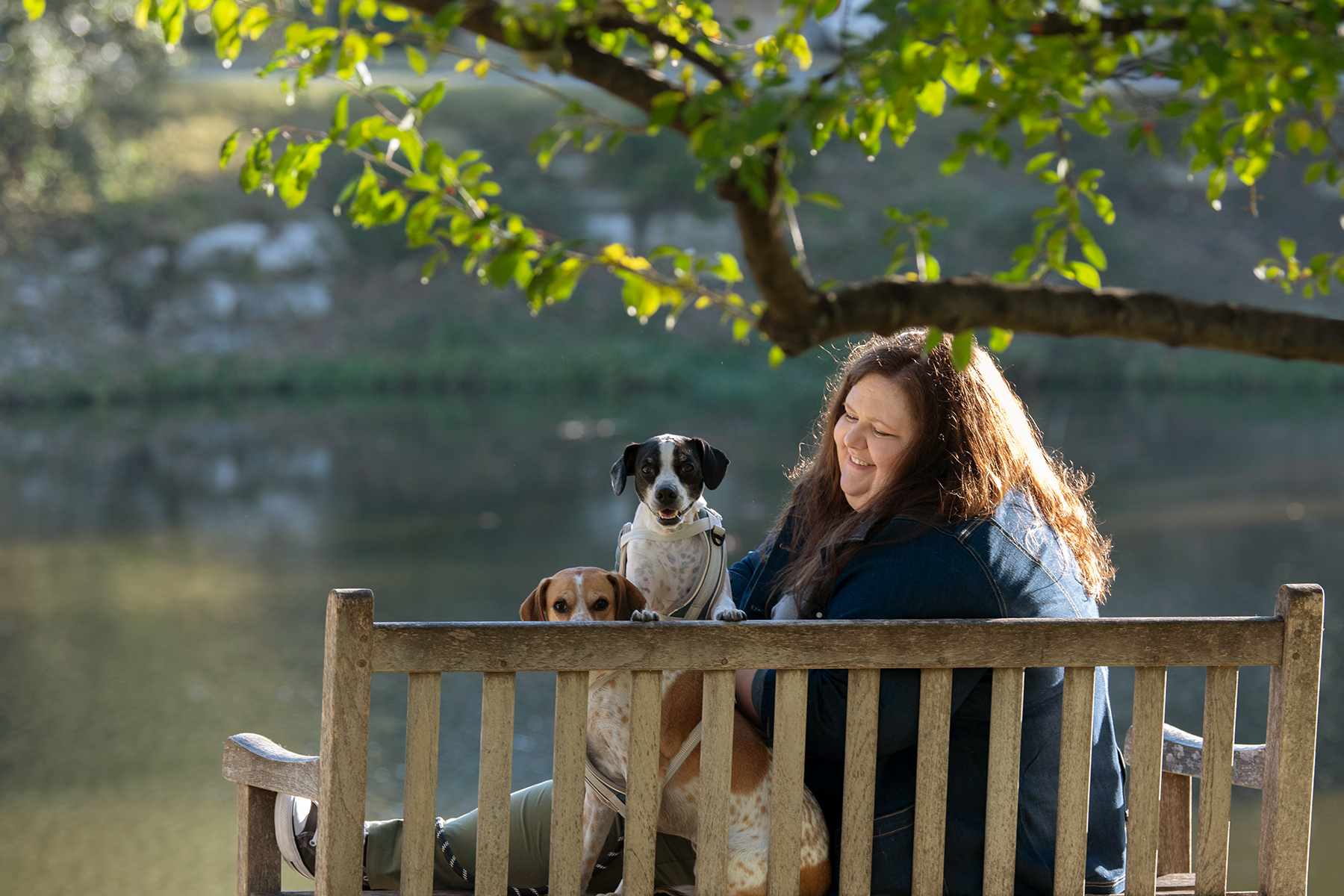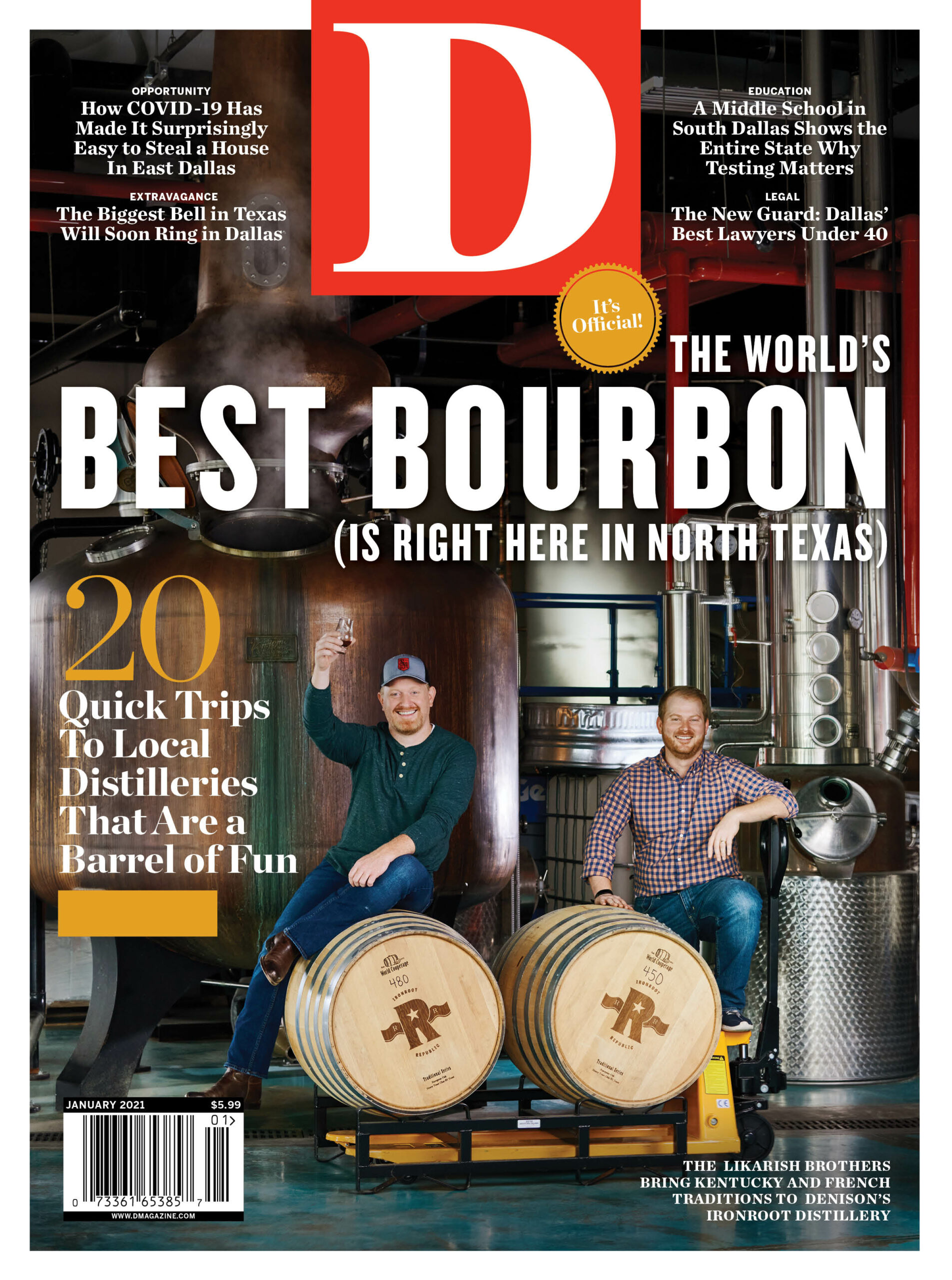When Terah Moxley graduated at the top of her Baylor University law school class in 2010, in the midst of the financial crisis, she had two words of advice for her classmates: don’t panic. From her current perch as a board-certified employment lawyer and partner at Estes Thorne & Carr, a women-owned boutique firm on Turtle Creek Boulevard, she offers the same advice for law school graduates now. Because, she says, just like the two terrier mixes she rescued a few years ago, you never know what might land in your lap.
You were first in your class at Baylor, no mean feat. I’m curious: were you one of the gunners or were you one of the quiet, stealthy types?
[laughs] I am a self-professed gunner. I mean, I was certainly not one who was shy about raising their hand. So I’ll accept the label of gunner for sure.
I hear dogs in the background. What kind are they?
I have two very clingy terrier-hound mixed mutts of some kind. They are rescues. A friend of mine from law school who practices in Houston fosters dogs and animals all the time. Three or four years ago, she posted a photo on Facebook of these two munchkins. I just immediately fell in love with them. I have named them after two of my favorite soccer players, Frankie and Terry. They are both sitting on my lap right now.
You’re a soccer fan? Are you a player?
I was a soccer player in elementary school. I was on a recreational team called the Orange Crush, and I was the only girl on my team. [laughs] I’m a soccer fanatic. They’re girl dogs, but I gave them boy names after two players in the English league, for Chelsea.
What made you decide to go to law school?
You know, that’s the question that I’ve always struggled with a little bit. I had this professor in undergrad who was part of the prelaw program, which I was not part of, but I took a class from him. And one thing he said was—and I’m not really sure how great this was for me to hear—but one thing he said was, “If you’re not 100 percent sure you want to be a practicing lawyer, don’t go to law school.” And I was like, “Oh, I’m not 100 percent sure.” So after undergrad, I took kind of a winding path and did a number of things. I ended up in Boston in 2006 doing election work, doing political campaign work. And after that election was over, I got offered a full-time gig to stay up there. And in the back of my mind I was like, well, what about law school?
I was a poli-sci undergrad, and the job I was being offered was kind of the job I imagined myself having once I graduated college. The fact that I really had any hesitation about it convinced me that I should pursue law school. So I moved home, took the LSAT, and applied.
My wife is an employment law attorney, and she always says that she’s drawn to the sex, drugs, and rock and roll of it all. What made you pick employment law as a specialty?
I didn’t really pick employment law so much as the employment law partner at the law firm I’m at now picked me to be her mentee. You know, I didn’t take a single employment law class in law school. It was just really nicely timed as right when I came to work at the firm, where I just had my nine-year anniversary. I’ve been there almost my entire career. Right when I started working at the firm, Lori Carr had a really busy employment law trial practice. And so she took me under her wing and taught me the ropes.
So it picked me way more than I picked it, but it’s been a great practice area for me. It definitely feeds the inner gunner nerd in me. It’s a really wide umbrella, so there’s a ton to learn. There’s a lot that can change. With election cycles—obviously you have a new administration coming in, and even here on the state level, the city level, things can change from time to time. There were three cities [Dallas, San Antonio, and Austin] that were trying to pass paid sick leave ordinances, and there was all the drama that went along with that. I mean, they all got stopped by lawsuits, but there’s a lot to keep me on my toes.
Most gunners don’t pick small firms. What drew you to Estes Thorne & Carr?
I clerked for a big international law firm when I was in law school, and I learned pretty quickly during that process that big law was not where I wanted to be. Part of the origin story of my firm is that all the founding partners came from big law and wanted to do things a little bit differently. We wanted to have closer client relationships and to restructure how compensation works. Having had the little experience I had in big law and knowing that that culture wasn’t what I wanted, the fact that these women had purposefully set out to set up something different was really appealing to me.
I read your article “Do You Speak Emoji?” that the Dallas Bar Association published last year. I didn’t realize that dancing ladies and Champagne bottles could create contract liability. What kind of pitfalls are you warning clients about in the employment context?
Employers, HR professionals, and business owners just need to continue expanding the scope of what they consider to be workplace communications or workplace interactions. We are all tied to these mobile devices all the time. We conduct business over text messages or Slack channels or internal chat messaging features. And the same offensive, potentially discriminatory, potentially harassing things that someone would say person-to-person don’t change just because someone sends it through a series of emojis or abbreviated words through a text message. And so they need to be aware of that and train their employees and their supervisors and managers on the rules that the employers lay out on not tolerating harassment or discrimination or retaliation. Those rules need to extend everywhere, even into these forms of communication that feel very informal.
Have you seen more issues like the one, well, raised by Jeffrey Toobin at The New Yorker, when he exposed himself to co-workers on a video call?
I’ll admit I have not come across that yet. There’s a kind of crass but not necessarily untrue statement that I’ve heard about employment-wise, that you’ve not really earned your stripes as an employment lawyer until you’ve had a case that requires you to look at some kind of naked photo. [laughs] But I have not had that come up during the pandemic. Certainly there are new work-from-home challenges for employers. There are scores of industries that have had to quickly transition to having workforces who never worked at home to completely working at home. And so there have been struggles all along as far as, how do you track employee time for people who get paid hourly and are eligible for overtime? How do you properly supervise people? For people who have kids who are home because of schools being closed, how do you properly administer the new [Families First Coronavirus Response Act] paid leave law? There’s been an incredible learning curve for businesses and HR professionals who I consider to be among the frontline workers because they have had to become experts in all sorts of things. And, of course, there’s always the concern that employers have that—knock on wood—when people are able to be in each other’s company without so much concern healthwise, are they going to be able to require people to come in to work? Or is this a permanent change? And if it is, who is it permanent for?
What are some of the other COVID-related challenges that you’ve seen employers encounter?
The issue that has come up the most is, can employers require someone to produce negative tests before they come back to work? We had that order from Dallas County that stated you couldn’t require that, so that’s been more of an issue: what can employers require employees to prove before they come back to work? Certainly, from a health and safety standpoint, employers are required to provide a safe workplace for their employees. Following the guidance that the CDC and OSHA put out, and local and state public health officials have put out, are certainly the best practices in terms of mitigating any potential liability.
One of the most significant changes on the legal front came in June, with the Supreme Court’s decision in Bostock v. Clayton County, which held that Title VII of the Civil Rights Act of 1964 protects employees against discrimination because of their sexual orientation or gender identity. Some may be surprised to know that the majority opinion was delivered by Justice Neil Gorsuch. Was the opinion a surprise for you?
Well, even before that decision came down—certainly for the clients that have employees in multiple states—I had always advised them that as a best practice it was always preferable to include gender identity and sexual orientation as protected classes in their employment policies. I feel like I had seen a shift the last four or five years that it had also become a bit of an employee morale issue, as employees become more vocal about wanting their employers to reflect their values more. I think that that is certainly a millennial, Gen Z sort of sentiment that we’re seeing. Really, the biggest change as far as my own practice goes is making sure that employers aren’t just making it a best practice, because Title VII now requires that policies get updated and that training happens.
Speaking of Gen Z, what advice do you have for young lawyers entering the labor market during these crazy times?
Not to panic. Everybody in our class graduated in the midst of the financial crisis. So the legal market was not very rosy. The speech that I gave at graduation, I remember that I included something that one of our professors had said to me. He said, “Don’t panic and take a job that you don’t want just because you’re afraid nothing else is going to come along.” You know, I thought that that was good advice 10 years ago. I think that’s probably still good advice now. Everyone’s going to find something, whether it’s hanging your own shingle up or finding a smaller firm. Keep an open mind. I never could have predicted that I would be a board-certified labor and employment lawyer when I was graduating law school. You never know what’s going to be a good fit.






